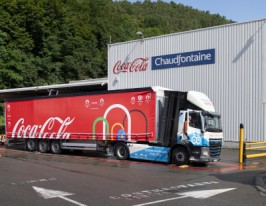In collaboration with Coca-Cola and Air Liquide, Toyota is undertaking a pilot program for a new hydrogen fuel cell, zero-tailpipe-emission long-haul truck. Toyota has started testing a new hydrogen-powered truck together with Coca-Cola as part of the beverage company’s supply operations.
The hydrogen-powered truck utilizes Toyota fuel cell modules, which combine hydrogen (H₂) and oxygen (O₂) molecules into water while simultaneously generating electricity. As a result, the only tailpipe emission is water. Moreover, fast refueling ensures high utilization rates.
Air Liquide, a provider of production and distribution of low-carbon and renewable hydrogen, supplies hydrogen from renewable origin for this project. This collaboration highlights the significance of concurrent development of both vehicles and infrastructure to foster more sustainability.
Through these hydrogen truck projects, Toyota intends to support the decarbonization of heavy-duty road transportation, which accounts for a quarter of European freight transport based on tonne-kilometers performed. Commercial trucks’ usage patterns and their demand for large volumes of hydrogen position them as key contributors in developing sustainable hydrogen infrastructures.
“We are pleased to partner with Toyota and Air Liquide to test hydrogen solutions for our long-distance logistics operations,” says Eric Desbonnets, vice president of Paris 2024 Operations and Sustainability, Coca-Cola. “We want to learn from this experience as we continue to work toward reducing our carbon footprint.
“Air Liquide shares the same ambition as Coca-Cola and Toyota: implementing concrete solutions to meet the challenge of climate change,” adds Erwin Penfornis, vice president, Hydrogen Energy World Business Line, Air Liquide. “This project is part of such an approach and will demonstrate the relevance of hydrogen for heavy-duty mobility. With a growing call for products with low-carbon transportation footprint, hydrogen is particularly well-suited to long-distance transportation, providing flexibility and productivity.”
“To help speed up the expansion of hydrogen technology implementation in our society, we are expanding the use of our Toyota Fuel Cell Module beyond passenger cars into trucks, buses, coaches, trains, boats, near-shore and short-sea vessels, stationary generators, and so on,” says Thiebault Paquet, vice president of R&D, Toyota Motor Europe. “It is a great pleasure to collaborate with like-minded partners and demonstrate our shared vision of sustainable mobility. The insights gained from this proof of concepts will serve as crucial milestones on our path toward achieving zero tailpipe carbon emissions in our logistics operations by 2040.”




